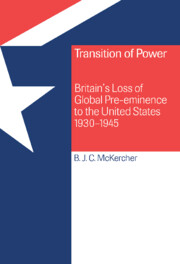Book contents
- Frontmatter
- Contents
- Acknowledgments
- List of abbreviations
- Prologue: Power and purpose in Anglo-American relations, 1919–1929
- 1 The end of Anglo-American naval rivalry, 1929–1930
- 2 The undermining of war debts and reparations, 1929–1932
- 3 Disarmament and security in Europe and the Far East, 1930–1932
- 4 The unravelling of co-operation, 1932–1933
- 5 Moving away from the United States, 1933–1934
- 6 Britain, the United States, and the global balance of power, 1934–1935
- 7 From Abyssinia to Brussels via London, Madrid, and Peking, 1935–1937
- 8 Appeasement, deterrence, and Anglo-American relations, 1938–1939
- 9 Belligerent Britain and the neutral United States, 1939–1941
- Epilogue: ‘A new order of things’, 1941–1945
- Select Bibliography
- Index
6 - Britain, the United States, and the global balance of power, 1934–1935
Published online by Cambridge University Press: 15 July 2009
- Frontmatter
- Contents
- Acknowledgments
- List of abbreviations
- Prologue: Power and purpose in Anglo-American relations, 1919–1929
- 1 The end of Anglo-American naval rivalry, 1929–1930
- 2 The undermining of war debts and reparations, 1929–1932
- 3 Disarmament and security in Europe and the Far East, 1930–1932
- 4 The unravelling of co-operation, 1932–1933
- 5 Moving away from the United States, 1933–1934
- 6 Britain, the United States, and the global balance of power, 1934–1935
- 7 From Abyssinia to Brussels via London, Madrid, and Peking, 1935–1937
- 8 Appeasement, deterrence, and Anglo-American relations, 1938–1939
- 9 Belligerent Britain and the neutral United States, 1939–1941
- Epilogue: ‘A new order of things’, 1941–1945
- Select Bibliography
- Index
Summary
I agree with Van[sittart] to the extent that we do not want to propitiate Japan at the expense of a hostile and jealous United States. At the same time I am entirely with you that we do not want to tie ourselves as we have done in the past to the United States, because she is unreliable and does not know her own mind and her statesmen do not know the mind of their own country.
Chatfield, June 1934Completed by July 1934, Cabinet examination of the DRC report determined the course of British diplomacy until Neville Chamberlain rose to the premiership three years later. This is because, despite alterations made by the politicians to particular defence spending programmes and the advent of strained Anglo-Italian relations in late 1935 over a crisis in Abyssinia, the one fundamental principle on which the report was founded remained untouched: vigilance concerning Germany and Japan. The economic and naval diplomacy of the Roosevelt Administration meant that the British had to consider American interests when making policy for Europe and the Far East. But because Washington's isolationism meant that the United States fell outside the ambit of improving defence deficiencies, London ignored the Americans in constructing British defence policy. Admittedly, until mid-1936, the threats that had preoccupied the DRC remained muted. In Europe, Hitler concentrated largely on domestic affairs.
- Type
- Chapter
- Information
- Transition of PowerBritain's Loss of Global Pre-eminence to the United States, 1930–1945, pp. 186 - 215Publisher: Cambridge University PressPrint publication year: 1999



